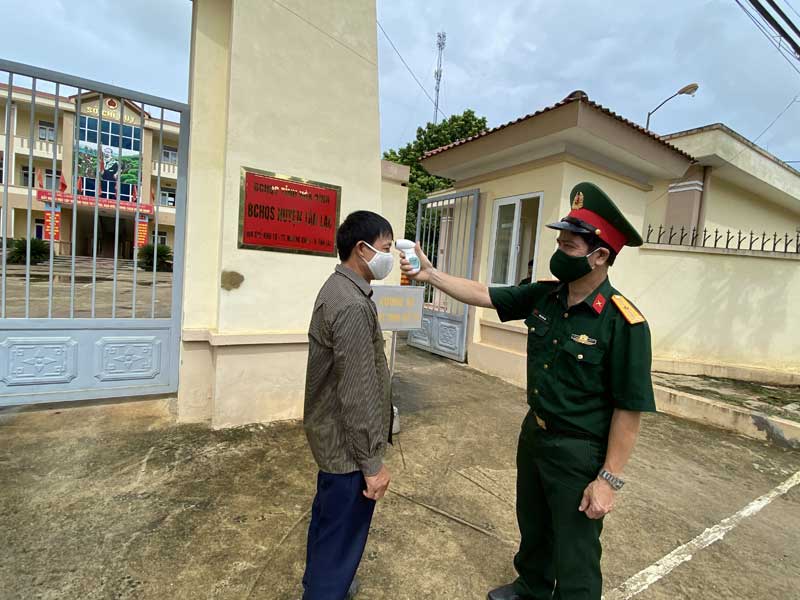
(HBO) – As from July, Hoa Binh province and other localities nationwide have entered a new fight against COVID-19, which is fiercer and more complex.
 A visitor to the
headquarters of the Military Command of Tan Lac district has his body
temperature checked.
A visitor to the
headquarters of the Military Command of Tan Lac district has his body
temperature checked.
The
return of the pandemic has affected daily activities of local residents.
However, under the instructions of the Government, ministries and agencies, locals’
awareness of COVID-19 prevention and control has improved significantly. The
majority of the population have stayed calm but vigilant in the fight.
According
to market management forces, there is no scarcity of essential products like
face masks and hand sanitisers at local pharmacies over the past 20 days.
Hoa
Binh has reported no cases of COVID-19 local infections so far. There are six COVID-19
patients in the province, who all returned from Russia and were quarantined at a
facility of Regiment 814. Four of the six cases were discharged from hospital
on August 4 while the remainder are being treated at the provincial general
hospital.
More
than 700 people in Hoa Binh are under quarantine at home. As many as 2,066
people returned from the central city of Da Nang,
now Vietnam’s
major pandemic hotspot.
The
province has traced people who had contract with the returnees for quarantining
and testing. Some
24,700 people have made voluntary medical declarations, with 1,475 cases verified
on the COVID-19 information system.
Hoang
Thi Thuy, Deputy Director of the provincial Health Department, suggested people
stay calm and updated, and should not stock up on face masks and food, while
implementing prevention and control measures./.
The Standing Board of the Hoa Binh provincial Party Committee has agreed in principle on a proposal by the Standing Board of the Party Committee of Hoa Binh city to gather feedback on the city’s 1:2000 zoning plan, which forms part of its broader urban development strategy.
Hoa Binh province has made notable progress in public administration reform and digital government development, with the satisfaction index among citizens and businesses reaching over 84%, according to recent government evaluations.
Thanks to great efforts by local authorities in recent times, the governance and public administration performance of Mai Chau district has been significantly improved.
In the afternoon of June 6, the Party Committee, the People's Council, the People's Committee and the Fatherland Front of Lac Son district solemnly held a meeting to celebrate the 139th anniversary of the district's founding (1886–2025) and the 79th anniversary of the establishment of the district's Party Committee (1946–2025). There was the attendance of Mr. Bui Van Thang, the Vice Chairman of the Provincial People's Council; Mr. Quach Tat Liem, the Vice Chairman of the Provincial People's Committee; Ms. Dang Bich Ngoc, the Deputy Head of the National Assembly Delegation of the province; as well as the former leaders of the province and district through various periods, who are the natives of the district.
Implementing the Politburo’s Resolution No. 57-NQ/TW on breakthroughs in science – technology, innovation, and digital transformation is a golden opportunity for the northern mountainous province of Hoa Binh to renew growth model, improve competitive edge and shorten digital gap.
Resolution 57-NQ/TW, issued by the Politburo on December 22, 2024, identifies sci-tech, innovation, and digital transformation as strategic breakthroughs to build a developed and prosperous nation. In Hoa Binh province, this spirit is not just a slogan, it’s being put into action through concrete initiatives that form a "new development triangle”: digital citizenship, digital economy, and digital administration.



 A visitor to the
headquarters of the Military Command of Tan Lac district has his body
temperature checked.
A visitor to the
headquarters of the Military Command of Tan Lac district has his body
temperature checked.